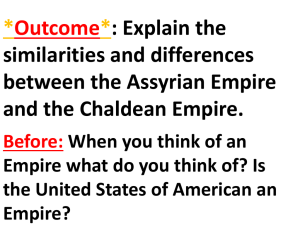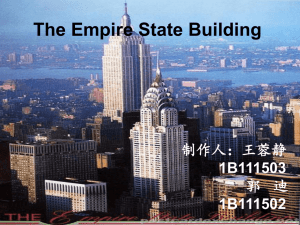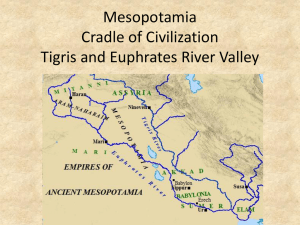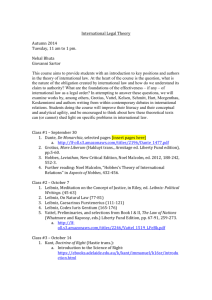2911_2013 - Harvard University
advertisement
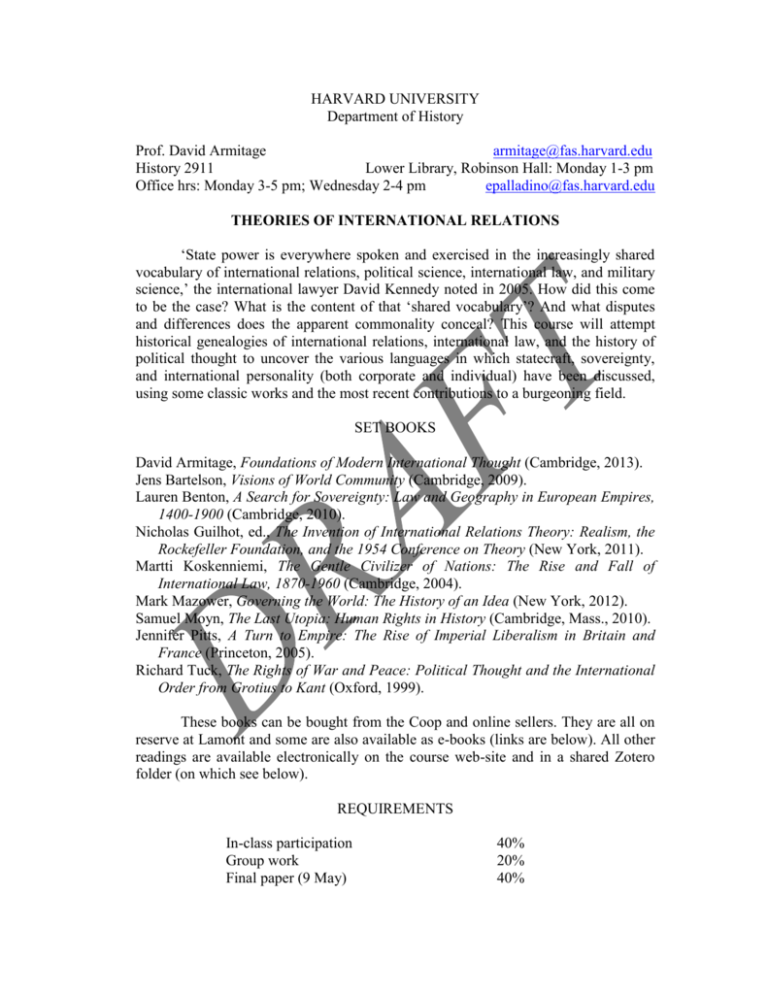
HARVARD UNIVERSITY Department of History Prof. David Armitage armitage@fas.harvard.edu History 2911 Lower Library, Robinson Hall: Monday 1-3 pm Office hrs: Monday 3-5 pm; Wednesday 2-4 pm epalladino@fas.harvard.edu THEORIES OF INTERNATIONAL RELATIONS ‘State power is everywhere spoken and exercised in the increasingly shared vocabulary of international relations, political science, international law, and military science,’ the international lawyer David Kennedy noted in 2005. How did this come to be the case? What is the content of that ‘shared vocabulary’? And what disputes and differences does the apparent commonality conceal? This course will attempt historical genealogies of international relations, international law, and the history of political thought to uncover the various languages in which statecraft, sovereignty, and international personality (both corporate and individual) have been discussed, using some classic works and the most recent contributions to a burgeoning field. SET BOOKS David Armitage, Foundations of Modern International Thought (Cambridge, 2013). Jens Bartelson, Visions of World Community (Cambridge, 2009). Lauren Benton, A Search for Sovereignty: Law and Geography in European Empires, 1400-1900 (Cambridge, 2010). Nicholas Guilhot, ed., The Invention of International Relations Theory: Realism, the Rockefeller Foundation, and the 1954 Conference on Theory (New York, 2011). Martti Koskenniemi, The Gentle Civilizer of Nations: The Rise and Fall of International Law, 1870-1960 (Cambridge, 2004). Mark Mazower, Governing the World: The History of an Idea (New York, 2012). Samuel Moyn, The Last Utopia: Human Rights in History (Cambridge, Mass., 2010). Jennifer Pitts, A Turn to Empire: The Rise of Imperial Liberalism in Britain and France (Princeton, 2005). Richard Tuck, The Rights of War and Peace: Political Thought and the International Order from Grotius to Kant (Oxford, 1999). These books can be bought from the Coop and online sellers. They are all on reserve at Lamont and some are also available as e-books (links are below). All other readings are available electronically on the course web-site and in a shared Zotero folder (on which see below). REQUIREMENTS In-class participation Group work Final paper (9 May) 40% 20% 40% Participation will take two forms: conventional discussion of the week’s readings in class and group work outside of class to create a comprehensive, shared, online bibliography of sources and readings on the themes of the course. For the latter, we will set up a group library in Zotero. Zotero is a plugin for Safari and Chrome that ‘lives’ in your browser; it is used for managing any digital materials you may come across in the course of your work. (If you are not already familiar with Zotero, please consult the online tutorials here.) We will add to and refine the group library over the course of the semester. You can then use it for field preparation and it can be made public for other students working in this area or preparing a general exam field for it in future. I hope that all participants, those taking the class for a grade and auditors or visitors, will add to this resource. If you are taking the class for credit, the final requirement for the course will be a historiographical paper (15-20 pages) or, if you are taking the class for seminar credit, a research paper (25-30 pages). Drafts of these papers should be posted in the group library or in DASH, Harvard’s open-access repository, unless you have good reason not to do so. In this way, I hope to encourage you to think of your work as a resource for all readers and as a contribution to public debate and knowledge beyond our classroom. SCHEDULE 1. January 28: INTRODUCTION 2. February 4: Approaching International Thought Martin Wight, ‘Why Is There No International Theory?’ (1959), in Herbert Butterfiled and Martin Wight, eds., Diplomatic Investigations: Essays in the Theory of International Politics (London, 1966), pp. 17-34. Duncan Bell, ‘Writing the World: Disciplinary History and Beyond,’ International Affairs, 85 (2009): 3-22. Armitage, Foundations of Modern International Thought, pp. 1-56. Bartelson, Visions of World Community. 3. February 11: Internationalism before the International Lauren Benton, A Search for Sovereignty: Law and Geography in European Empires, 1400-1900 (Cambridge, 2010). 4. February 18: NO CLASS (Presidents’ Day) 5. February 25: Emergent Universalisms Pitts, A Turn to Empire, pp. 1-122. Armitage, Foundations of International Thought, pp. 154-87. Jennifer Pitts, ‘Empire and Legal Universalisms in the Eighteenth Century,’ American Historical Review, 117 (2012): 68-91. 6. March 4: The Empire of International Law: I Koskenniemi, The Gentle Civilizer of Nations, pp. 1-265. Andrew Fitzmaurice, ‘Liberalism and Empire in Nineteenth-Century International Law,’ American Historical Review, 117 (2012): 92-121. 7. March 11: The Empire of International Law: II Koskenniemi, The Gentle Civilizer of Nations, pp. 266-517. Koskenniemi, ‘International Law as Political Theology: How to Read Nomos der Erde?,’ Constellations, 11 (2004): 492-511. March 14-15: Graduate Conference on Law and International History SPRING BREAK 8. March 25: Early Modern Foundations Tuck, The Rights of War and Peace, pp. 1-108. Noel Malcolm, ‘Alberico Gentili and the Ottomans,’ in Benedict Kingsbury and Benjamin Straumann, eds., The Roman Foundations of the Law of Nations : Alberico Gentili and the Justice of Empire (Oxford, 2010), pp. 127-44. Annabel Brett, Changes of State: Nature and the Limits of the City in Early Modern Natural Law (Princeton, 2011), pp. 1-61, 195-224. 9. April 1: Toward Perpetual Peace? Tuck, The Rights of War and Peace, pp. 109-234. Armitage, Foundations of International Thought, pp. 59-90. Sankar Muthu, ‘Conquest, Commerce, and Cosmopolitanism in Enlightenment Political Thought,’ in Muthu, ed., Empire and Modern Political Thought (Cambridge, 2012), pp. 199-231. 10. April 8: From the Law of Nations to International Law Pitts, A Turn to Empire, pp. 123-257. Duncan Bell, ‘Dissolving Distance: Technology, Space, and Empire in British Political Thought, 1770-1900,’ Journal of Modern History, 77 (2005): 523-63. Casper Sylvest, ‘“Our Passion for Legality”: International Law and Imperialism in Late Nineteenth-Century Britain,’ Review of International Studies, 34 (2008): 403-23. April 15: PROSPECTUS DUE (in class) 11. April 15: Inventing ‘International Relations’ Stanley Hoffman, ‘An American Social Science: International Relations,’ Daedalus, 106 (1977): 41-60. Nicholas Guilhot, ed., The Invention of International Relations Theory: Realism, the Rockefeller Foundation, and the 1954 Conference on Theory (New York, 2011). 12. April 22: Human Rights in a World of States Samuel Moyn, The Last Utopia: Human Rights in History (Cambridge, Mass., 2010). 13. April 29: Instituting Internationalism Mark Mazower, Governing the World: The History of an Idea (New York, 2012). 9 May: FINAL PAPER DUE (in PDF by midnight)



